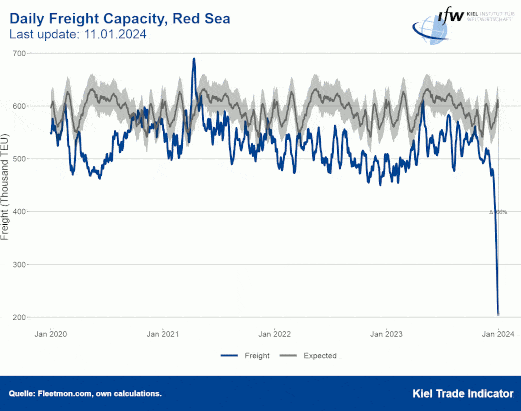
Due to the repeated attacks on ships in the last few years,
weeks in the southern Red Sea region, the volume of
containerized cargo transported on the route that crosses it is
collapsed by more than half and is currently almost the
70% lower than the normally expected volume. This is underlined by the Kiel
Institute for the World Economy, the German research institute on
globalisation, specifying that the "Kiel Trade
Indicator", the index developed by the institute that estimates
the import and export intensity of 75
nations, the EU and world trade, points out that
last December, the import-export of Germany and the EU
with East Asia, it has in some cases been considerably
lower than the previous month, decrease attributable to
probably attacks on container ships in the Sea
Red.
The Kiel Institute has announced that in December 2023, the
World trade prices fell by -1.3% on a quarterly basis
compared to the previous month, with indicators for the Union
which are negative for both exports (-2.0%) and
imports (-3.1%). Germany's foreign trade has also
followed the weakening trend of recent months, with the
exports (-2.0%) and imports (-1.8%) declined on a year-on-year basis
monthly.
«The diversion of ships around the Cape of Buona
Hope in Africa Caused by Red Sea Attacks - ha
noted Julian Hinz, director of the Trade Policy Research Center and
new head of the Kiel Trade Indicator - means that the weather
Necessary to transport goods from production centers
to European consumers is significantly extended to
20 days. This is also reflected in declining trade data
for Germany and the EU, as the goods transported are now
still at sea and have not yet been unloaded in ports such as
provided'.
According to the Kiel Institute, since the middle of last month
the volume of container traffic transiting the Red Sea is
has decreased dramatically and currently stands at only 200,000
TEUs per day compared to around 500 thousand TEUs in November 2023, and this
- the institute specified - means that the current volume is
-66% lower than expected on a volume basis
transited in the years 2017 to 2019.
The German institute's report points out that, however, if the
Containerized traffic in the Red Sea has collapsed, it is expected
but a minimal negative impact on world trade,
despite the significant increase in the required browsing time
circumnavigating Africa and the consequent significant increase in the number of
sea freight rates, with a fee for transporting a container from
40 feet between China and Northern Europe which is currently even
to more than $4,000 compared to about $1,500 in the
last November, but the price is still very high.
away from the peaks recorded during the Covid-19 pandemic
when transporting a 40' container on this route cost up to
to $14,000.
"Despite the significant increase in transport costs -
Hinz pointed out - no obvious consequences are therefore expected on the
consumer prices in Europe, especially as the share of consumer prices in Europe
freight costs on the value of goods for expensive items, such as
Consumer electronics, it's only a few thousandths."
In addition, Hinz specified that the current situation is not
comparable to that during the coronavirus pandemic or to
that of the blockade of maritime traffic in the canal for six days
in March 2021 caused by the stranding of the
container ship Ever Given: at that time - he explained - "the
blockades led to a drastic reduction in the supply of goods and
demand in Europe exploded at the same time', while now -
noted - "Apart from slightly longer delivery times,
for products from the Far East and the increase in
transport costs, at which the network of ships
container ships should adapt quickly, there are no
Expect negative consequences for global trade."
